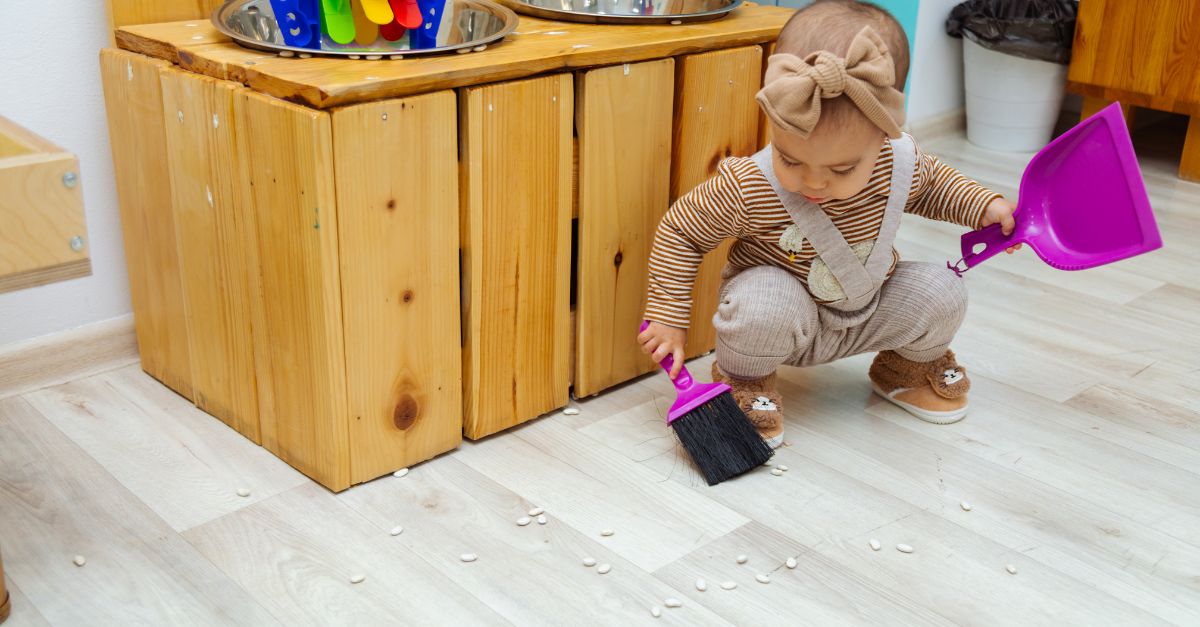As early childhood educators and caregivers, you have a profound impact on fostering toddlers' developing independence. The early years are a time of immense curiosity, determination, and an inherent desire to explore the world. By making intentional and thoughtful decisions throughout the day to nurture toddlers' autonomy, you empower them to take ownership of their actions and decisions. This not only builds their confidence and self-reliance but also supports the development of essential life skills. Through small, consistent steps, you can help toddlers cultivate a sense of agency, belonging and mastery over their environment.

Below are four strategies to individualize routines and encourage greater independence:
- Provide Opportunities for Self-Sufficiency
Toddlers thrive when given the chance to practice self-help skills. Simple tasks like placing their shoes in a cubby, pouring water into a cup, stacking a block, or putting toys back in their designated spots can instill a sense of accomplishment. Tailor these opportunities based on each child's abilities—a younger toddler might start with handing you their shoes, while an older one might practice fastening velcro straps themselves. By scaffolding tasks to meet their developmental level, you enable success and encourage persistence.
- Incorporate Choices into Daily Routines
Offering choices is a powerful tool in the early childhood classroom that can help toddlers develop a sense of control, autonomy, and decision-making skills. By providing small, manageable options throughout the day, children are empowered to make decisions that align with their preferences and interests. This practice not only reduces frustration but also promotes independence and self-confidence.
For instance, during circle time, allow children to choose where they'd like to sit—on a chair, a cushion, or on the floor. This simple decision helps them feel involved in the group setting and establishes a sense of ownership over their learning environment. Alternatively, when transitioning between activities, you can give children a choice between two or three options for their next task, such as building with blocks, reading a book, or drawing. When choice-making is woven into routines, toddlers develop decision-making skills and feel a greater sense of belonging and control over their environment.
The key to making choices effective is to limit the options to a manageable number (usually two or three) to avoid overwhelming toddlers. Choices should be presented in a way that is clear and simple, ensuring that children feel capable of making an informed decision. By offering these small, empowering choices, educators help toddlers practice skills that are foundational to their development, including problem-solving, self-regulation, and confidence in their abilities.
- Create Predictable and Flexible Routines
Having a predictable routine is essential for toddlers as it provides a sense of security and structure, helping them understand what comes next throughout the day. When toddlers know what to expect, it helps reduce anxiety and supports their ability to become more independent. For example, a morning routine in the classroom could include steps such as putting away their belongings, washing hands, and then selecting a book for storytime. This consistent structure offers toddlers a sense of stability, allowing them to move through the day with confidence.
However, while consistency is important, it's equally crucial to allow for flexibility within the routine to accommodate each child's unique preferences and developmental needs. For example, one child might need more time to transition from one activity to another, while another may feel more comfortable with a quicker pace. Offering this flexibility ensures that each child's individual needs are met, promoting a sense of inclusion and respect for their unique way of learning and processing information.
One way to introduce flexibility without disrupting the flow of the routine is by using gentle reminders and visual cues. These tools help guide toddlers through transitions in a calm and predictable way, making it easier for them to understand what's coming next without feeling overwhelmed. Visual schedules, like picture cards or a daily chart where you can point out to the children where you are in the day and where you are going can be especially helpful for toddlers, as they provide a concrete representation of the day's events. This helps children mentally prepare for transitions, whether it's moving from playtime to clean-up or from snack time to circle time.
Offering small choices within these routines, such as selecting which book to read for storytime or which song to sing, can further empower toddlers to feel a sense of ownership over their day. This combination of predictability, flexibility, and choice supports the development of self-regulation, decision-making, and confidence.
- Encourage Independent Problem-Solving During Play
Playtime offers a unique and valuable opportunity for toddlers to develop critical life skills such as independence, problem-solving, and resilience. By providing open-ended materials such as building blocks, crayons, or sensory bins, you create an environment that encourages exploration and experimentation. These types of materials give toddlers the freedom to use their imagination and creativity, helping them build both cognitive and emotional strength.
Rather than immediately stepping in when a challenge arises, give toddlers space to work through problems on their own. This approach not only fosters self-confidence but also teaches them how to persist in the face of difficulty. For example, if a toddler is struggling to stack blocks and is becoming frustrated, rather than offering immediate help, take a step back and observe. You might comment on their efforts, saying something like, "You're trying so hard to balance those blocks!" This acknowledges their persistence and encourages them to continue experimenting, while reinforcing the idea that making mistakes is a natural part of the learning process.
Offering guidance only when needed helps toddlers build resilience. It shows them that they are capable of solving problems and working through frustrations, which builds both patience and emotional regulation. By resisting the urge to intervene too quickly, you're fostering a mindset that challenges are opportunities for growth rather than obstacles.
It's also helpful to model curiosity and a positive attitude towards challenges. For example, if a toddler is having trouble with a task, you might say, "Hmm, how can we make this work? Let's try stacking the blocks in a different way." This invites them to think critically about their approach and gives them permission to make mistakes, reinforcing that it's okay to fail and try again.

The Role of Connection and Encouragement
As toddlers navigate their journey toward growing independence, your support and encouragement play an essential role in their development. Acknowledge their efforts with specific, positive feedback, such as, "You worked so hard to put all the crayons back in the box!" This kind of affirmation not only celebrates their achievements but also reinforces their confidence and fosters a positive attitude toward trying new things. Even the smallest victories, when celebrated, become stepping stones that motivate toddlers to continue taking on challenges with enthusiasm and resilience.
By thoughtfully individualizing routines and creating consistent opportunities for autonomy, you help toddlers build the foundational skills and self-assurance they need to thrive both in the classroom and beyond. These everyday moments of independence—whether it's choosing a book, building a tower, or choosing where to sit on the carpet—lay the groundwork for their future success. Your role in guiding them with patience, encouragement, and understanding is invaluable, as every small step they take toward independence marks a significant leap in their overall development. Your support empowers them to grow into confident, capable learners, ready to face new challenges with determination and a sense of self-worth.

Want to keep learning? Dive deeper into early childhood education insights and strategies on our early childhood education blog here!